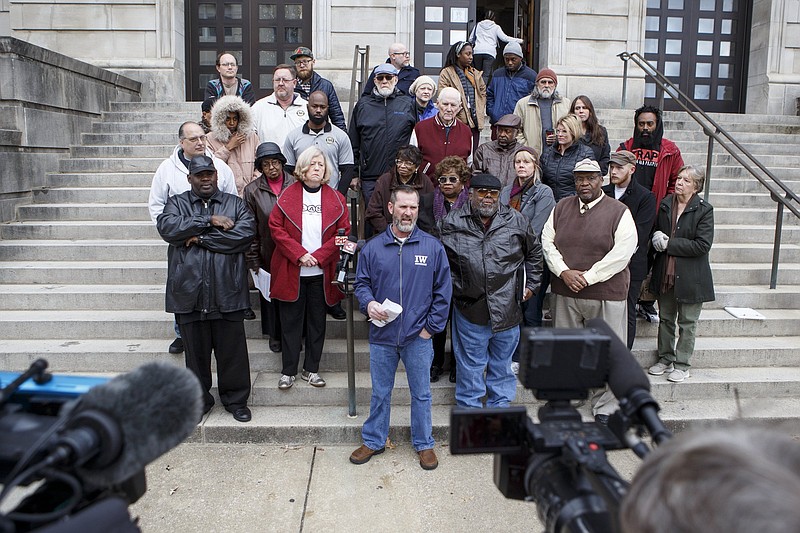I'm not sure how to trust city of Chattanooga Mayor Andy Berke anymore.
Every future proposal for civic cooperation will seem suspect, every past speech about "The Chattanooga Way" now illusory and feigned.
This sense of distrust has been growing; Berke took office as a champion of the people, a Springsteen-of-a-mayor, yet he now seems too frequently a champion of un-democratic development, not communities.
The last straw came Monday.
Despite being asked by some of our city's most respected community leaders, Berke flatly refused to postpone plans to rezone - from residential to industrial, or M1 - the former Harriet Tubman housing project.
It was a stinging, unjust response to a justified request. For years, often at the city's urging, residents in Area 3 neighborhoods have been envisioning, studying and planning ways to resurrect the land around Tubman.
You know, some people have argued, you can't recreate the glitzy Southside in Glenwood. Bushtown won't ever be the North Shore.
Ok, fine. Nobody's even asking for that.
After all, aren't there more alternatives than that? Is projecting the nearly all-white Main Street experience onto historically black communities all we can really imagine?
Have we abandoned the cornerstone idea that every neighborhood deserves some decent portion of creative investment, happiness and autonomy? And that folks are free to define that portion as they see it?
Sure, Berke deserves applause for buying the Tubman property in 2014 so slumlords wouldn't.
But that's what any good mayor should do. Protecting the health and well-being of neighborhoods isn't heroic; it should be standard governmental practice.
Why abandon that now?
"We don't just need jobs, we need living-wage jobs. We don't just need housing, we need housing that we can afford. We don't just need revitalization, we need a real seat at the table in development decisions," reads a statement from the 50-year-old Unity Group that was read Monday by several group members at the Chattanooga-Hamilton County Regional Planning Commission.
Monday, planners rejected the Unity Group's request, unanimously approving Berke's rezoning.
Adding salt in the wound, Charles Wood, vice president at the Chattanooga Area Chamber of Commerce, addressed the crowd by reading off statistics about Area 3 poverty, as if doing so would somehow enlighten them to the need for industry jobs.
Did the Chamber not realize how condescending this would seem? To browbeat poverty statistics to the very people living in poverty?
"Doesn't he realize I know this already?" one man later said. "I live and breathe this every day. I don't need him patronizing me."
If the Chamber is so concerned about local poverty, why didn't it shout those same statistics to argue against the recent Opportunity Zone application that prioritized development-rich downtown over neglected Area 3?
In a city that prides itself as innovative, the industrial, M1 rezoning feels like the smallest vision possible, like scraps-from-the-table, concrete-bleacher planning. It says the trajectory of Area 3 will not change.
Elsewhere - at the old Alstom site, as local leader Helen Burns Sharp has written, or the Wheland Foundry - the city creatively plans and rezones, offering concessions to developers.
Why not also at Tubman?
For years, Berke, who has always promised transparent government, encouraged citizen input. City Hall-led meetings. Nonprofit charettes. The official Area 3 visioning process, which isn't even yet finished.
Yet in a surprise October meeting, residents were suddenly told Tubman would be rezoned industrial. (This is the same meeting at which Berke's staff wanted to allow only questions first submitted on index cards, like some linguistic poll tax.)
In Berke's rezoning plan, there's no talk of a Community Benefits Agreement, first discussed in 2013, which would hold developers accountable.
As it stands now, 100 percent of any future Tubman jobs could be commuter jobs; a factory could hire all its workers from 50 miles away, which would make zero dent in Area 3 poverty.
One or two years ago? Even three months ago? Nobody ever imagined City Hall doing such a thing.
Is it because there's an industrial buyer scratching at the door, ready to develop?
If so, why not announce that?
Some people are wondering if there's not another possible answer:
In March, the city received a $100,000 state grant to study the Tubman land in preparation for development.
Has the city ever released the findings of that study?
What if the study revealed something that would prevent mixed-use development? Like in-the-ground pollution? Or lingering environmental contaminants that would require millions of dollars to remedy?
Would a rushed rezoning to industrial cover that up?
Maybe this sounds like tin-foil-hat conspiracy to you. Maybe you believe City Hall is better than that.
I hope so.
On Jan. 8, the rezoning must be approved, or voted down, by the City Council.
"We know that creating a truly community-informed development is a long process with a lot of work, planning, compromise and partnership," the Unity Group statement read. "But this is what our community needs and deserves."
David Cook writes a Sunday column and can be reached at dcook@timesfreepress.com or 423-757-6329.

